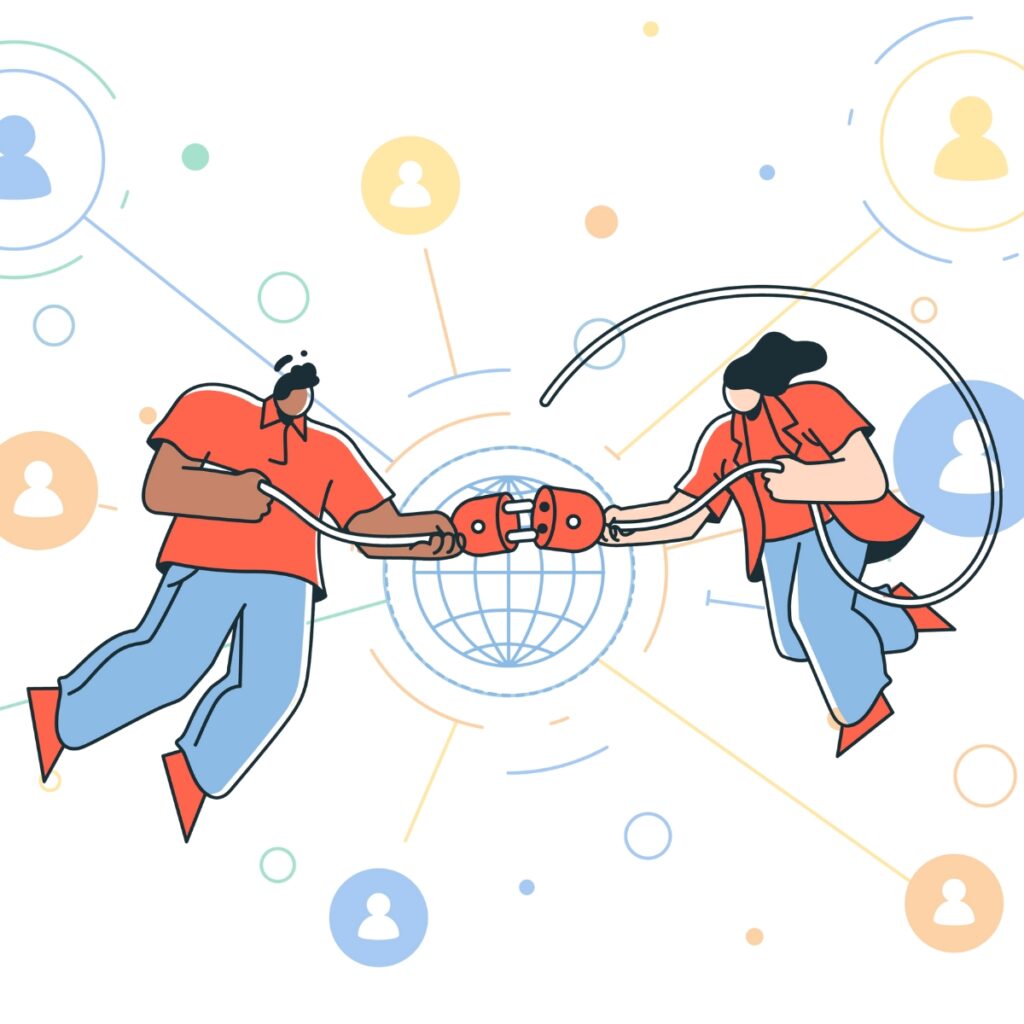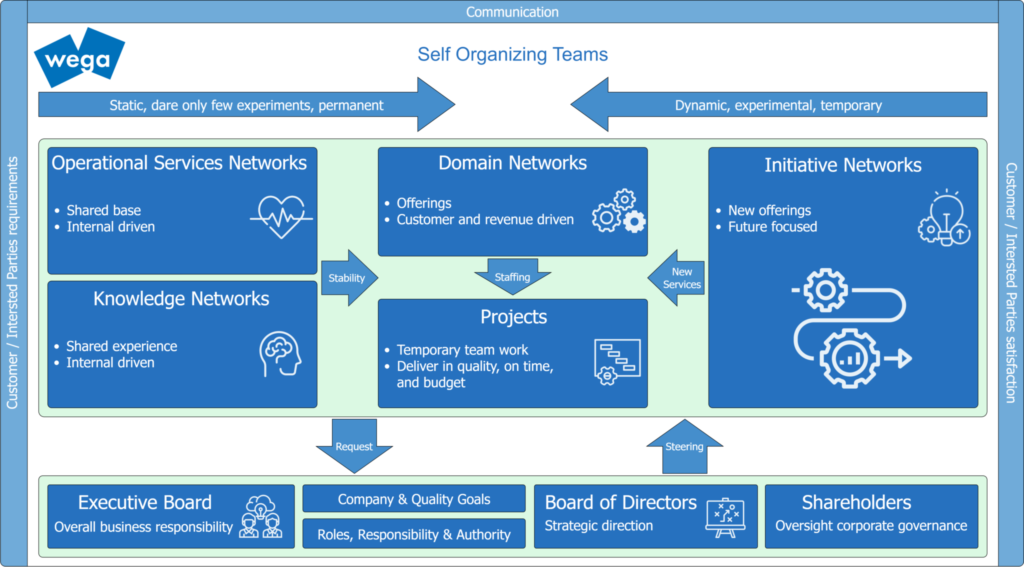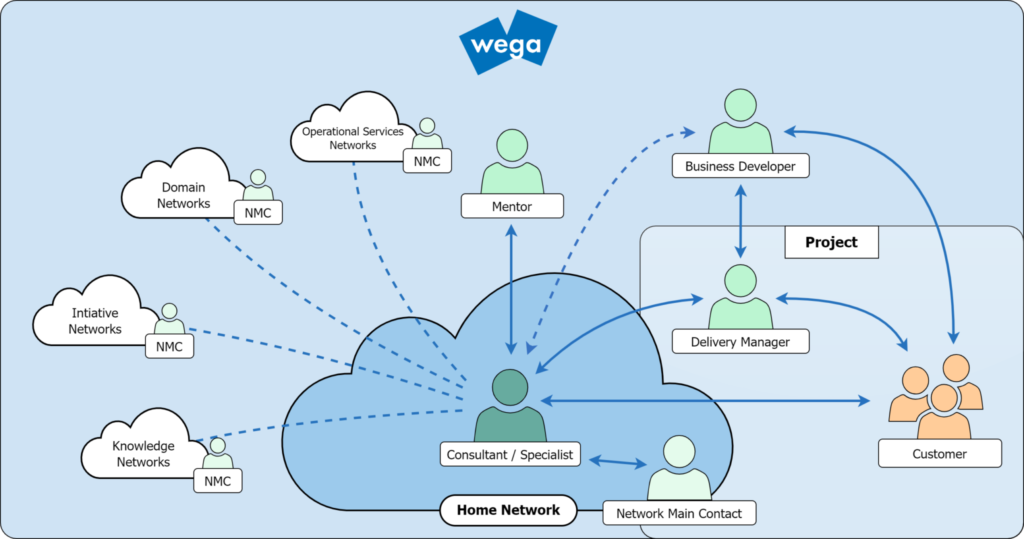Building Connections and Growth in a Network Organization: Introducing Our Roles Framework and the Mentor Role
Written by Evelyne Daniel

In a previous article, we outlined our company’s network organization model—a flexible structure built to empower employees within a collaborative framework. This model includes four network types: domain, knowledge, initiative, and operational services. Each employee belongs to a home network (which is a domain network for consultants) while allowing to engage in multiple networks as roles and interests expand. Our self-organized structure encourages employees to lead their own professional growth and pursue new opportunities in the company.

Today, in this article, we’re excited to delve into our roles framework, which serves as the foundation of our network organization, fostering clarity, guidance, and growth. At its core is the mentor role —in fact the first role we defined when starting our explicit transition towards roles and networks.
The Mentor Role: Guiding Growth and Embedding Values
Our roles framework promotes both individual and organizational growth, encouraging flexibility and accountability. Instead of fixed positions, employees take on roles that evolve with their interests and goals, enabling continuous learning and meaningful contributions across client and internal projects.

The Mentor Role: Guiding Growth and Embedding Values
The mentor role, the first role we formalized, is essential to our organization, providing support and guidance to each employee, or mentee. Every employee has a mentor who serves as a trusted contact within the organization. Mentors act as ambassadors of wega’s values and mission, fostering professional development and helping mentees navigate our organization.
Key Responsibilities of the Mentor:
- Integration within the Organization: Mentors help mentees feel well-integrated within wega’s networks, processes, and culture.
- Continuous Professional Development: Mentors work with mentees to set and achieve goals, supporting skill development and self-reflection.
- Representation of Company Values: Mentors embody wega’s values, promoting a positive, growth-oriented environment.
What the Mentor Role Is Not:
To clarify, mentors are not responsible for setting targets or assessing performance, nor are they responsible for remuneration decisions. While mentors may share relevant company-wide information with their mentees, they do not replace company-wide information sessions, which provide updates via formal channels. Additionally, mentorship is designed to foster growth, not dependency. Each employee is responsible for seeking the information and resources they need to support their development. While mentors offer guidance, it is up to the mentee to take ownership of their progress rather than relying solely on the mentor for direction.
Mentoring Principles:
- Tailored Approach: Each mentor-mentee relationship is unique, tailored to mentee needs and mentor strengths. Trust underpins these relationships, with mentors supporting skill development as mentees articulate their goals.
- Confidentiality: Conversations in meetings are confidential unless both parties agree otherwise.
- Standardized Support: Mentors and mentees meet at least monthly, using a “cheat sheet” of key topics and a mentor checklist. Mentors proactively seek additional support when needed.
The Role of Mentors in Onboarding New Employees
An essential part of our onboarding process, the mentor role also includes temporary mentorship assignments for new employees. These temporary mentors help new team members acclimate, ensuring a smooth transition by aiding with standard onboarding and helping them feel integrated into our company culture and processes from day one.
The Value of Mentorship and Investment in Employees
While mentoring requires time and resources, it’s an investment wega prioritizes because it benefits both employees and the company. When employees feel supported and well-integrated, they are more likely to develop a stronger connection to the company and contribute more effectively over time. This commitment to mentorship underscores our belief that a supported, empowered team leads to long-term success for both individuals and the organization.
Employee Feedback on the Mentor Role
Feedback from employees has highlighted the many benefits of regular exchanges with mentors:
- Dedicated Time and Attention: Mentors provide focused time for open discussion on any topic.
- Safe, Objective Advice: Mentors offer an objective perspective, encouraging self-reflection.
- Mutual Learning and Connection: Both mentors and mentees gain from the relationship, especially for our consultants, where regular support and exchange is vital.
- Proactivity and Individualization: The mentor-mentee relationship is highly individualized, encouraging mentees to shape their development paths.
Mentorship is not just about guidance — it’s a two-way street for learning and growth. Mentees are encouraged to be proactive and self-aware, engaging in their professional development to enhance their individual and organizational growth.
How Mentors are Assigned
When the mentor role was introduced, employees could volunteer to become mentors, and each employee was asked to select three potential mentors. Assignments balanced mentors’ capacity, with each supporting three to eight mentees. This process has evolved: Now there is a process in place to support mentor changes as requested by mentors or mentees. Mentors also meet regularly to align on mentoring practices and share insights.
Introducing other Key Roles in our Network Model
Since establishing the mentor role, we’ve introduced additional roles essential to our growth and success:
- Business Developers: Grow business by securing new clients and projects, enhancing existing relationships, and acting as internal experts in sales, contracts, and negotiations.
- Delivery Managers: Oversee project execution, ensuring quality and client satisfaction.
- Network Main Contacts: Serve as key liaisons within networks, supporting self-organization and alignment.
- Consultants: Provide expertise to our customers - our core business.
- Specialists: Provide expertise in internal services, such as HR, finance, and marketing.
Future articles will provide an in-depth look at these roles, exploring how they support our network’s growth and employees’ development.
Looking Ahead: Expanding the Roles Framework
Our roles framework will continue to evolve, introducing new roles or adapting existing ones to meet changing needs. Through this model, we aim to create an environment that values growth, flexibility, and meaningful connections. Looking forward, we are committed to empowering employees, fostering their development, and building a workplace where everyone thrives.
As we say at wega: "In trust we thrive together."
